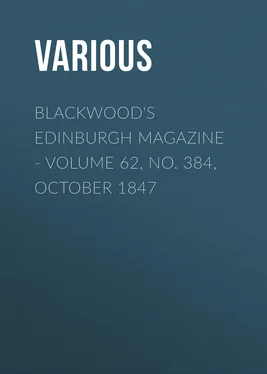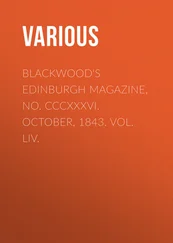Various - Blackwood's Edinburgh Magazine - Volume 62, No. 384, October 1847
Здесь есть возможность читать онлайн «Various - Blackwood's Edinburgh Magazine - Volume 62, No. 384, October 1847» — ознакомительный отрывок электронной книги совершенно бесплатно, а после прочтения отрывка купить полную версию. В некоторых случаях можно слушать аудио, скачать через торрент в формате fb2 и присутствует краткое содержание. Издательство: Иностранный паблик, Жанр: foreign_antique, periodic, foreign_edu, на английском языке. Описание произведения, (предисловие) а так же отзывы посетителей доступны на портале библиотеки ЛибКат.
- Название:Blackwood's Edinburgh Magazine - Volume 62, No. 384, October 1847
- Автор:
- Издательство:Иностранный паблик
- Жанр:
- Год:неизвестен
- ISBN:нет данных
- Рейтинг книги:5 / 5. Голосов: 1
-
Избранное:Добавить в избранное
- Отзывы:
-
Ваша оценка:
- 100
- 1
- 2
- 3
- 4
- 5
Blackwood's Edinburgh Magazine - Volume 62, No. 384, October 1847: краткое содержание, описание и аннотация
Предлагаем к чтению аннотацию, описание, краткое содержание или предисловие (зависит от того, что написал сам автор книги «Blackwood's Edinburgh Magazine - Volume 62, No. 384, October 1847»). Если вы не нашли необходимую информацию о книге — напишите в комментариях, мы постараемся отыскать её.
Blackwood's Edinburgh Magazine - Volume 62, No. 384, October 1847 — читать онлайн ознакомительный отрывок
Ниже представлен текст книги, разбитый по страницам. Система сохранения места последней прочитанной страницы, позволяет с удобством читать онлайн бесплатно книгу «Blackwood's Edinburgh Magazine - Volume 62, No. 384, October 1847», без необходимости каждый раз заново искать на чём Вы остановились. Поставьте закладку, и сможете в любой момент перейти на страницу, на которой закончили чтение.
Интервал:
Закладка:
Henceforward, however, upon the whole, the career of Andersen is prosperous, and his life genial. We find him in friendly intercourse with the best spirits of the age. The lad who walked about Odense with long yellow locks, bare-headed, and bare-footed, and who was half reconciled to being a tailor's apprentice, because he should get plenty of remnants to dress his puppets with—is seen spending the evening with the royal family of Denmark, or dining with the King of Prussia, who decorates him with his order of the Red Eagle! He has exemplified his text—"people have a deal of adversity to go through, and then they become famous."
Those who have read "The Improvisatore," the most ambitious of the works of Andersen, and by far the most meritorious of his novels, will now directly recognise the materials of which it has been constructed. His own early career, and his travels into Italy, have been woven together in the story of Antonio. So far from censuring him—as some of his Copenhagen critics appear to have done—for describing himself and the scenes he beheld, we are only surprised when we read "The True Story of his Life," that he has not been able to employ in a still more striking manner, the experience of his singular career. But, as we have already observed, he betrays no habit or power of mental analysis; he has not that introspection which, in the phrase of our poet Daniel, "raises a man above himself;" so that Andersen could contemplate Andersen, and combine the impartial scrutiny of a spectator with the thorough knowledge which self can only have of self. So far from censuring him for the frequent use he makes of the materials which his own life and travels afforded him, we could wish that he had never attempted to employ any other. Throughout his novels, whenever he departs from these, he is either commonplace or extravagant,—or both together, which, in our days, is very possible. If he imitates other writers, it is always their worst manner that he contrives to seize; if he adopts the worn-out resources of preceding novelists, it is always (and in this he may be doing good service) to render them still more palpably absurd and ridiculous than they were before. He has dreams in plenty—his heroes are always dreaming; he has fevered descriptions of the over-excited imagination—a very favourite resource of modern novelists; he has his moral enigmas; and of course he has a witch (Fulvia) who tells fortunes and reads futurity, and reads it correctly, let philosophy or common sense say what it will. His Fulvia affords his readers one gratification; they find her fairly hanged at the end of the book.
We are far enough from attempting to give an outline of the story of this or any other novel—such skeletons are not attractive; but the extracts, and the observations we have to make, will best be understood by entering a few steps into the narrative.
Antonio, the Improvisatore, is born in Rome of poor parents. He is introduced to us as a child, living with his fond mother, his only surviving parent, in a room, or rather a loft, in the roof of a house. She is accidentally run over and killed by a nobleman's carriage. A certain uncle Peppo, a cripple and a beggar, claims guardianship of the orphan. Of this Peppo we have a most unamiable portrait. His withered legs are fastened to a board, and he shuffles himself along with his hands, which were armed with a pair of wooden hand clogs. He used to sit upon the steps of the Piazza de Spagna. "Once I was witness," says the Improvisatore, who tells his own story, "of a scene which awoke in me fear of him, and also exhibited his own disposition. Upon one of the lowest flights of stairs sat an old blind beggar, and rattled with his little leaden box that people might drop a bajocco therein. Many people passed by my uncle without noticing his crafty smile and the waivings of his hat; the blind man gained more by his silence—they gave to him. Three had gone by, and now came the fourth, and threw him a small coin. Peppo could no longer contain himself: I saw how he crept down like a snake, and struck the blind man in his face, so that he lost both money and stick. 'Thou thief!' cried my uncle, 'wilt thou steal money from me—thou who art not even a regular cripple—cannot see—that is all! And so he will take my bread from my mouth.'"
On great occasions Peppo could quit his board and straddle upon an ass. And now he came upon his ass, set Antonio before him, and carried him off to his home or den. The boy was put into a small recess contiguous to the apartment which his uncle occupied with some of his guests. He overheard this conversation: "Can the boy do any thing?" asked one; "Has he any sort of hurt?"
"No; the Madonna has not been so kind to him," said Peppo; "he is slender and well formed, like a nobleman's child."
"That is a great misfortune," said they all; and some suggestions were added, that he could have some little hurt to help him to get his earthly bread until the Madonna gave him the heavenly. Conversation such as this filled him with alarm; he crept through the aperture which served for window to his dormitory; slid down the wall, and made his escape. He ran as fast as he could, and found himself at length in the Coliseum.
Antonio, at this time, is a poor boy about nine or ten years old; we have seen from what sort of guardian the terrified lad was making his escape. Now, observe the exquisite appropriateness, taste, and judgment of what follows. It is precisely here that the author makes parade of the knowledge he has lately gained in the grammar-school of Slagelse—precisely here that he throws his Antonio into a classical dream or vision!
"Behind one of the many wooden altars which stand not far apart within the ruins, and indicate the resting-points of the Saviour's progress to the cross, 3 3 Not very clearly expressed by the translator. One would think that our Saviour, in his progress to the cross, had passed through the area of the Coliseum, and not that each of the pictures on these altars represented one of the resting-points, &c. Mrs Howitt is sometimes hasty and careless in her writing. And why does she employ such expressions as these:—"many white buttons," "beside of it," "beside of us?" We have read a many English books, but never met them in anyone beside of this.
I seated myself upon a fallen capital, which lay in the grass. The stone was as cold as ice, my head burned, there was fever in my blood; I could not sleep, and there occurred to my mind all that people had related to me of this old building; of the captive Jews who had been made to raise these huge blocks of stone for the mighty Roman Cæsar; of the wild beasts which, within this space, had fought with each other, nay, even with men also, while the people sat upon stone benches, which ascended step-like from the ground to the loftiest colonnade.
"There was a rustling in the bushes above me; I looked up, and fancied that I saw something moving. Oh, yes! my imagination showed to me pale dark shapes, which hewed and builded around me; I heard distinctly every stroke that fell, saw the meagre black-bearded Jews tear away grass and shrubs to pile stone upon stone, till the whole monstrous building stood there newly erected; and now all was one throng of human beings, head above head, and the whole seemed one infinitely vast living giant body.
"I saw the vestals in their long white garments; the magnificent court of the Cæsar; the naked bleeding gladiators; then I heard how there was a roaring and a howling round about, in the lowest colonnades; from various sides sprang in whole herds of tigers and hyænas; they sped close past the spot where I lay; I felt their burning breath; saw their red fiery glances, and held myself fast upon the stone upon which I was seated, whilst I prayed the Madonna to save me. But wilder still grew the tumult around me; yet I could see in the midst of all the holy cross as it still stands, and which, whenever I had passed it, I had piously kissed. I exerted all my strength, and perceived distinctly that I had thrown my arms around it; but every thing that surrounded me trembled violently together,—walls, men, beasts. Consciousness had left me,—I perceived nothing more. When I again opened my eyes, my fever was over."
Читать дальшеИнтервал:
Закладка:
Похожие книги на «Blackwood's Edinburgh Magazine - Volume 62, No. 384, October 1847»
Представляем Вашему вниманию похожие книги на «Blackwood's Edinburgh Magazine - Volume 62, No. 384, October 1847» списком для выбора. Мы отобрали схожую по названию и смыслу литературу в надежде предоставить читателям больше вариантов отыскать новые, интересные, ещё непрочитанные произведения.
Обсуждение, отзывы о книге «Blackwood's Edinburgh Magazine - Volume 62, No. 384, October 1847» и просто собственные мнения читателей. Оставьте ваши комментарии, напишите, что Вы думаете о произведении, его смысле или главных героях. Укажите что конкретно понравилось, а что нет, и почему Вы так считаете.












